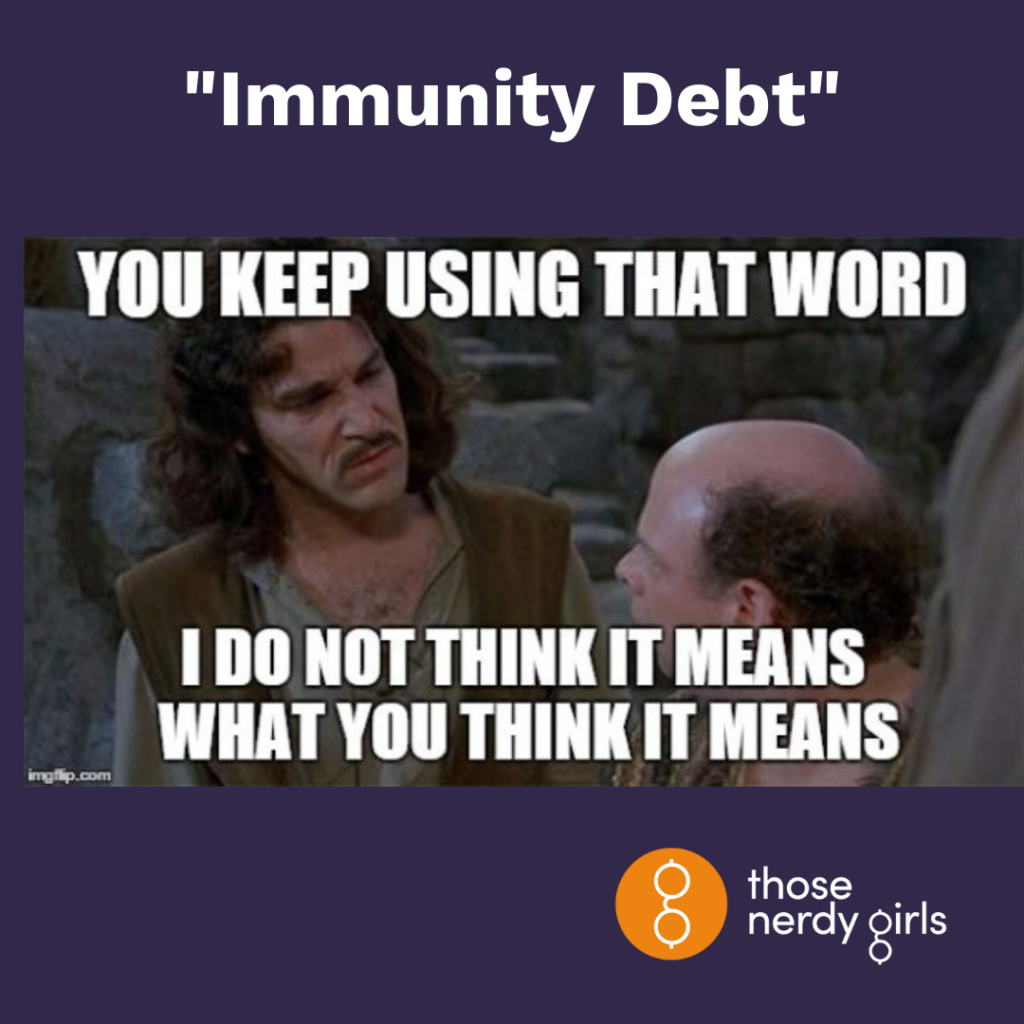A: Yes and No. But the term itself is proving confusing and unhelpful.
TL;DR: There is no “immunity debt” for individuals. We don’t need to get infected to protect us from…. getting infected.
The fewer pathogen exposures over a lifetime, the better. (Just ask previous generations who suffered through measles, cholera, polio, smallpox, etc). For kids to develop a healthy immune system, they need exposure to “friendly” microbes in the natural environment (e.g. dirt).
For *populations*, it’s true that we are likely seeing some catch-up from previous low transmission. “Debt” is a bad choice of words, as there is no fixed number of infections we “owe” that must be paid back. Viral dynamics are driven by many factors, and it’s unlikely the flu and RSV infections that were avoided during COVID will be canceled out by this bad season.

The US and other countries are seeing an early and serious uptick in both RSV and influenza this season, hitting young kids and pediatric hospitals particularly hard.
The internet has been abuzz that these high levels of non-COVID respiratory infections are due to an “immunity debt” acquired because of reduced transmission during periods of COVID precautions. While many are referring to the population-level phenomenon, some are suggesting that people’s immune systems have gotten “weaker” for not having been exposed to these viruses. There is no truth to this idea—see our previous post here: https://dearpandemic.org/fewer-germ-exposures/
It’s true that COVID disrupted normal patterns of circulation of many pathogens, including flu and RSV. This means more people are in the “susceptible” pool who were not recently exposed to these bugs. Thus, it’s not surprising to see temporarily higher than average levels of these viruses as social interactions return to normal. There also may have been “viral competition” keeping rates of other viruses low when COVID rates were high. This does not mean that the overall benefits of reduced circulation of these viruses during COVID was cancelled out now. We saw much reduced hospitalization due to things like asthma and COPD during COVID when common respiratory viruses were not circulating. Reducing baseline circulation of these viruses protects vulnerable people, it doesn’t create a “debt” that must be repaid in full to some virus loan shark ![]() .
.
We’ve had very low flu circulation since COVID arrived, but we already saw a serious (and off-season) RSV surge in the summer of 2021. As we’ve learned during the whole pandemic, we should maintain some humility about what causes surges and falls in infections—it’s complicated. Some have suggested the pediatric hospitalization surge reflects more severe RSV and flu infections due to weakened immunity from the high number of COVID infections this past year. While this is a legitimate hypothesis that should be tested, right now we don’t have any solid evidence to support this idea.
The real problem with the use of “immunity debt” term is that it mixes up the question of population immunity (trivially true) versus effects on individual immunity (not true). The term did not exist in scientific literature prior to 2021, and the lack of precision in its use has led to a lot of confusion and finger pointing from different camps. While one side invokes the term to imply that COVID restrictions may have done more harm than good, the other side critiques the myth of weakened individual immunity without acknowledging the legitimate “catch-up” effects at the population level.
As scientists, Those Nerdy Girls try hard to make room for nuance. We’re not here to pick rhetorical sides, and more than one thing can be true at the same time. Covid precautions can be both a net positive for population health and one contributor to current RSV and flu surges.
BOTTOM LINE:
![]() As a society we are playing some “catch-up” with viral transmission we missed in the past couple of years. The net benefits of missing those infections are likely still high.
As a society we are playing some “catch-up” with viral transmission we missed in the past couple of years. The net benefits of missing those infections are likely still high.
![]() Our immune systems are not weakened through lack of viral exposures. They *may* be temporarily weakened due to COVID infections–but this research is still speculative and TBD.
Our immune systems are not weakened through lack of viral exposures. They *may* be temporarily weakened due to COVID infections–but this research is still speculative and TBD.
Stay tuned here for the science… and try to tune out the noise!
Love,
Those Nerdy Girls
______________________
Additional Links:
Nature: Flu and colds are back with a vengeance — why now?
McGill University: Claims of an Immunity Debt in Children Owe Us Evidence
Nuffield Trust: Emergency admissions for asthma and COPD during Covid-19


